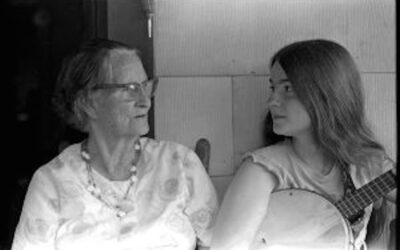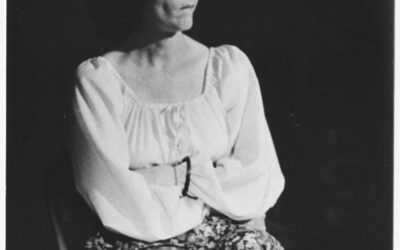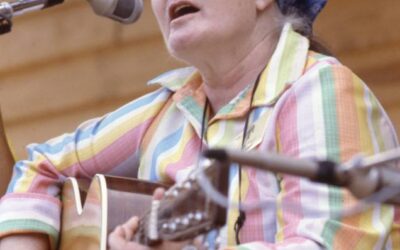Maud Karpeles is an often unrecognized heroine of the preservation and promotion of English folk song and dance. On a 1909 trip to Stratford-On-Avon, Maud and her sister had their first exposure to English folk song and dance, which became a major life focus for both women. It was also on this trip that Maud met a folk dance teacher named Cecil Sharp. Cecil and Maud started a working relationship that lasted until his death in 1924. When Cecil founded the English Folk Dance Society in 1911 (which later merged with the Folk Song Society to become the English Folk Dance and Song Society), Maud served as his principal collaborator.
In 1916, Maud accompanied Cecil, as assistant and collaborator, on his second folk song-collecting trip to America. Their goal was to capture ballads in the southern Appalachians from descendants of English, Scottish, and Irish settlers. Maud transcribed lyrics, while Cecil captured the tunes. They made three trips between 1916 and 1918, collecting 274 songs and 969 tunes, which were published in two volumes. Cecil credited Maud as “editor” for these volumes and Dame Edith Campbell as “collaborator”; however, the true extent of the contribution these women made to the works is difficult to determine and under debate.
After Cecil died in 1924, Maud became his literary executor and remained involved with the English Folk and Song Society until 1938, when she was maneuvered aside by her brother-in-law. He, as director after Cecil’s death, disagreed with Maud advocating women be allowed to dance the strictly “male” dances. Mention is also made that there were issues with Cecil Sharp copyrights, though details were not forthcoming. After this ousting, Maud continued her devotion to dance and capturing songs. She traveled to Newfoundland (a trip honoring Cecil, who wished to have gone there) to learn if their folk music was part of the Scottish-Irish-English ballad “carrying stream” from the old countries to the new. Maude brought her organization and administrative skills in establishing an international folk movement through the International Folk Music Council in 1947, dedicated to “recognizing the scientific, social and artistic aspects of folk music and their interdependence.” She enjoyed the respect of distinguished scholars and musicians.
Maud’s contributions in capturing and preserving English folk songs and dances remain mostly hidden behind the works of others. Nevertheless, she persevered because she felt strongly that folk music was a living tradition that needed to be experienced and protected. In recognition of her work, Maud was honored with an Order of the British Empire in 1961 (OBE was established by King George V to honor those who served in non-combative roles during World War I and later expanded to include contributors to Arts, Science, Charitable work and Public Service).




